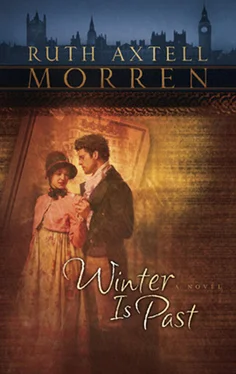Winter Is Past
Winter Is Past
Ruth Axtell Morren
www.millsandboon.co.uk
I wish to dedicate this story to:
Yeshua ha Mashiach,
who taught me that little becomes much
in the master’s hand;
To the Rebeccas I have known,
who went home early to be with Him;
And to Rick,
who has given me the opportunity to
study the male psyche up close over the years.
Foreword
Chapter One
Chapter Two
Chapter Three
Chapter Four
Chapter Five
Chapter Six
Chapter Seven
Chapter Eight
Chapter Nine
Chapter Ten
Chapter Eleven
Chapter Twelve
Chapter Thirteen
Chapter Fourteen
Chapter Fifteen
Chapter Sixteen
Chapter Seventeen
Chapter Eighteen
Chapter Nineteen
Chapter Twenty
Chapter Twenty-One
Epilogue
When a cousin of mine began investigating the possibilities of Jewish ancestry in our family’s Colombian/Venezuelan roots, I suddenly became interested in the Sephardic branch of Judaism. Soon I was fascinated with the story of the expulsion of the Sephardic Jews from Spain in 1492.
In Spain, under the Inquisition, thousands of Jews were forced to convert to Catholicism. However, many of them continued to practice their religion clandestinely. When they were expelled from Spain and eventually migrated to Holland, the Middle East, England and the New World, they were more accustomed, perhaps, than Ashkenazi and other non-Sephardic Jews, to leading a “double life” between outward Christianity and inner Judaism.
During the early nineteenth century, when Winter Is Past takes place, Jews living in England were gaining greater acceptance in mainstream Christian society, though the old prejudices were still thriving. I’ve used this background in telling the story of Methodist nurse Althea Breton and her employer, Simon Aguilar, a Jew by birth who has for political reasons become a member of the Church of England. When Althea meets Simon for the first time, she faces her own ugly prejudices against Jews. At first afraid and unsure of what to expect from this “foreign man,” Althea realizes that she has believed half-truths, not God’s true word regarding the Jewish people. Soon, through her faith and newly gained knowledge of Simon and his family, Althea comes to see that Jews, much like Christians, are people of faith, family and love. Sadly, it took somewhat longer for England to officially acknowledge this.
The most famous story of an English converso is Benjamin Disraeli (1804–1881). He was a Sephardic Jew whose family migrated to England from Italy. Although his career in Parliament didn’t begin until about a decade after Simon’s, Disraeli, too, received baptism as an adolescent, attended a private school run by an independent minister and was elected to Parliament. Back then, only baptized members of Britain’s official state church could receive higher education, wed legally or hold public office. Luckily, in 1858, a law was passed making it legal for Jews to be admitted as members of Parliament, paving the way for Disraeli as England’s first and only Jewish prime minister.
For further reading on Sephardic Jewry, I highly recommend The Cross and the Pear Tree: A Sephardic Journey by Victor Perera.

London, 1817
“So you’re the miracle worker.”
Althea stared back at the man addressing her across the wide mahogany desk, his eyes deep and dark and mocking. They held mystery and an ancestry centuries old. The small, wire-rimmed oval spectacles did nothing to diminish the force of the hooded brown irises fringed by thick lashes and framed by heavy, black brows.
“Lady Althea Pembroke,” he stated when she remained silent, the mockery edging his tone soft as the feathery quill he brushed against his fingertips.
“I am Althea Breton,” she answered the dark-haired man. When he continued looking at her from behind his desk, the sound of the feather against his skin magnified in the still room, she added, “Lord Skylar requested me to come.”
“Yes, he spoke to me of you.” The tone revealed nothing beyond the words. “But I believe he spoke to me of Lady Althea Pembroke. You are his sister, are you not?”
She removed her gaze from his, realizing the answer was not a simple one. Why had Tertius compelled her into this interview, she asked herself for the hundredth time.
She took a deep breath, reining in her frustration like a woman gathering her skirts against the wind. “I am sorry for the confusion,” she managed to say at last. “I am Lord Skylar’s half sister. Perhaps my brother did not have a chance to explain to you.”
He made a gesture of impatience with ink-stained fingers. They were long and pale, illuminated in the circle of light cast by the Argand lamp. “Well, Lady Althea—Miss Breton—whatever name you choose to go by, the important thing is, do you know anything of nursing? Your brother seems to think so.”
Irritated by the insinuation she was operating under an alias, she compressed her lips to avoid any ill-advised reply. He didn’t bother to await her answer, but looked back down at the papers he’d been studying when she’d been bidden to come in. So now she must speak to the crown of dark, disheveled curls, she thought, annoyed at his obvious inattention. It hadn’t been her idea to come here, she wanted to tell him! She was here only as a favor to her brother, who’d practically begged her to hear his friend out. Now she was made to feel as if she were groveling for a position, when that was the last thing she was in need of. The last thing she desired. She was quite fine where she was, she wanted to clarify to those unruly locks.
As she looked at the bowed head and observed the rapid movements of the long, slim fingers, something inside her stirred, remembering her brother’s stories. Had this man truly been unmercifully tormented at Eton by his fellow students, all because he was a Jew?
The word still gave her a shudder of revulsion as she pictured the greasy, black-garbed moneylenders in the East End. She tried to stifle it as she cleared her throat, deciding her best course was to get this uncomfortable interview over with. She spoke to the dark head. “If I can be of any help to your daughter, I would appreciate the opportunity to try.” Her tone emerged sounding calm and collected.
When he did not answer immediately, she studied what she could see of his features. They certainly belied the image she had had. The Honorable Simon Aguilar looked younger than she’d pictured a man of thirty-two with four years in the House of Commons. He’d been the youngest member of Parliament elected since Pitt the Younger, which proved his brilliance and wit, according to Tertius, qualities which her brother had first witnessed in the schoolboy at Eton.
Her gaze traveled farther. He wasn’t handsome, more like arresting, she judged. His cheeks were clean-shaven, with only a shadow of beard against the pale skin; the nose not the hooked beak she expected, but high-bridged and chiseled; the lips a cushion of crimson accentuating the pallor of his skin. His physiognomy denoted a man of study, not a rapacious swindler of the poor. If the dim, book-lined shelves on either side of the room were any indication, he rarely saw the light of day.
He looked up, catching her observation. He waved a hand to a seat in front of the desk, as if just then noticing that she still stood in front of it like a servant awaiting orders. “Please, my lady, have a seat.”
Читать дальше













